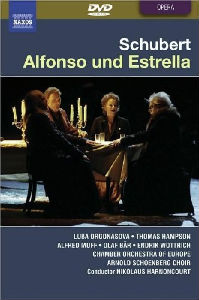When our coquine Doyenne invited those interested to review recordings I kindly requested Italian belcanto and early French works. Instead, I got a DVD
of Schubert’s Alfonso und Estrella (ahem, in German!), thus the title of this review.
It was one of those WTF? moments, and I thought La C. was in a PMS attack. The only few words I know in German is “Ich komme Helga!” (pre-condom era porn line), “Ich liebe sexy Marcello Giordani”, and “What on earth Aprile Millo is saving her voice for?” (the latter is not in German, but I had to get it off my chest.) Anyway, I couldn’t disappoint La C., therefore I decided to take the challenge, pulled my long wavy auburn hair back, put my Biki crepe de soie robe de chambre, un peu plus de noir sur mes yeux (à la Dalida) and put myself to work.
The production comes from Theater an der Wien, filmed during performances in May of 1997, as part of the celebrations for Schubert’s 200th anniversary. Many may not know that Schubert wrote any opera at all. My researches showed me that he attempted at least ten operas and this was the first one that actually got finished, in collaboration with the librettist Franz von Schober who was always faithful to him (I smell kind of a Cary Grant–Randolph Scott thing there) following an invitation by Domenico Barbaia, then the newly appointed Italian manager of the theater.
The fact that it was first rejected may be partly due to an unenthusiastic Michael Vogl (for whom the part of Froila was conceived), soprano Anna Milder-Hauptmann, and Weber who kept bitching about it. In 1854, long after Schubert’s death, an adapted version was given its premiere in Weimar by Franz Liszt for whom Schober acted as secretary.
The storyline is simple: The setting is eighth century Spain. Alfonso lives with his father Froila, the rightful king of Leon whose throne is usurped by Mauregato (he is mean, so mean you have no idea, a real cattivo). Estrella is the latter’s daughter; she and Alfonso make out big time, I mean fall in love. A horny Adolfo, rejected by Estrella leads a rebellion (it was certainly easy to do this type of show-offs at those times) but is captured by Alfonso. All ends happily.
The cast is quite decent. Luba Orgonasova as Estrella gives an outstanding performance. Schubert was most generous to her part in his work. Lubika is blessed with a gorgeous and voluptuous instrument. The Slovak soprano is mainly known to European audiences, especially for her Mozart interpretations. She looks à la Sutherland sometimes.
The part of Alfonso is sung by Endrik Wottrich, the only disappointment of this production. Such a sublime part could only be sung this bad. One wishes a spinto lirico tenor in this part with a great deal of Lied experience to do justice to it. At one point in the beginning of Scene II, he says to his father “I lack the strength of voice.” He is damn right.
The part of Adolfo is a very demanding one, sitting mainly on the top register. Blessed with a strong bass, Alfred Muff disappoints with his complete acting disability, one of those who constantly need to look at the conductor. On the other hand, Olaf Bar as Mauregato exhibits all his successful lieder background. The projection is effortless, smooth and legato, although the voice is small in size.
As Froila, Thomas Hampson sings beautifully but never in the persona, as is always the case. My prayers to hopefully see him one day change his constant facial expression (once described here as the “look Ma, I can sing” look) remain unanswered His pronunciation is exquisite and his interpretation is exemplary. Since I don’t have a score in hand, I’m not sure if the high pianissimi are as written or his choice to cover his natural strain on his top register. Nevertheless, Hampson has always been a true musician and the production is clearly standing on him. He eventually gets the warmest reception from the audience.
Our maestro for the occasion is Nikolaus Harnancourt. Nikky does a decent job, especially during the beautiful overture. This is not a very hard piece to conduct, since the music is not complex in the “grand opera” tradition. His orchestra responds well to him. They obviously prepared well for this.



